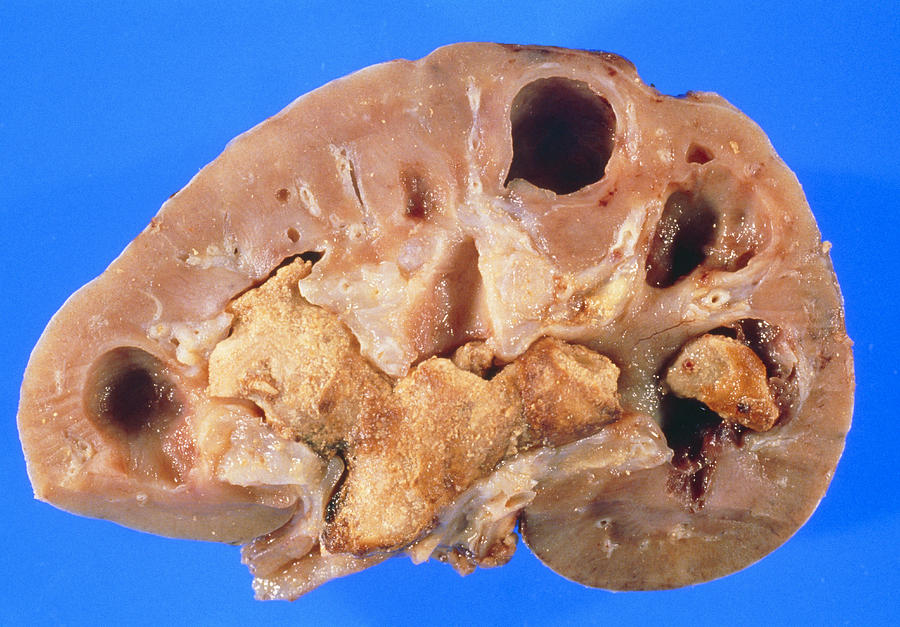A lot of people think that kidney stones are just a minor inconvenience that can be easily shrugged off, but those who have experienced this condition know just how debilitating it can be. One type of kidney stone that can be particularly troublesome is the staghorn calculus.
What is a Staghorn Calculus?
A staghorn calculus is a type of kidney stone that gets its name from its unique shape. It tends to look like a horn with several branches, hence the term "staghorn."
One of the most challenging things about staghorn calculi is that they can grow quite large, sometimes filling the entire renal pelvis where urine normally collects before passing through the ureter and eventually out of the body. This means that these stones can block the flow of urine, leading to pain, discomfort, and potential complications like urinary tract infections, sepsis, or even kidney damage.
What Causes Staghorn Calculi?
Staghorn calculi form in the kidneys when certain substances in the urine crystallize and start to clump together. The exact substance or substances that lead to the formation of these stones can vary from person to person, but in general, staghorn calculi tend to be made up of a combination of calcium, oxalate, and phosphate.
There are many different factors that can increase the risk of developing staghorn calculi, including:
- Dehydration
- Obesity
- High blood pressure
- Family history of kidney stones
- A diet high in protein, salt, or sugar
- A history of urinary tract infections
Symptoms of Staghorn Calculi
The symptoms of staghorn calculi can vary widely depending on how big the stone is, where it's located, and whether or not it's causing a blockage. Some common signs and symptoms to watch out for include:
- Pain or discomfort in the back, side, or abdomen
- Bloody or cloudy urine
- Nausea or vomiting
- Fever or chills
Treatment Options
The treatment for staghorn calculi will depend on a variety of factors, including the size and location of the stone, as well as the severity of the symptoms. In general, treatment options can include:
- Drinking plenty of fluids to help flush the stone out of the body
- Taking pain medication to help manage discomfort
- Using shockwave therapy to break up the stone into smaller pieces that can be more easily passed out of the body through the urine
- Surgically removing the stone if other methods aren't effective
Prevention
As the saying goes, an ounce of prevention is worth a pound of cure. If you're someone who has a history of kidney stones, there are steps you can take to reduce your risk of developing staghorn calculi:
- Drink plenty of water throughout the day to stay hydrated and help flush out your kidneys
- Avoid foods that are high in salt, sugar, or protein, as these can contribute to the formation of stones
- Stay at a healthy weight, as obesity can increase your risk of developing kidney stones
- Get regular check-ups with your doctor to monitor your kidney health and identify any potential issues early on
A staghorn calculus can be a serious condition that requires prompt medical attention, but with the right treatment and prevention strategies, it's possible to manage and even avoid this type of kidney stone altogether. If you think you may be experiencing symptoms of staghorn calculi, don't hesitate to reach out to your healthcare provider for guidance and support.
A staghorn calculus can be seen in this radiological image.

This is a picture of a kidney stone, which can be similar in appearance to a staghorn calculus.
If you are looking for Qiao's Pathology: Kidney - Staghorn Calculus(乔氏病理学:鹿角形肾结石) | Flickr you've visit to the right page. We have 6 Pics about Qiao's Pathology: Kidney - Staghorn Calculus(乔氏病理学:鹿角形肾结石) | Flickr like Sectioned Kidney Showing Large Staghorn S Photograph by Dr. E. Walker, Staghorn calculus in patient with recurrent fevers, hematuria and flank and also Renal Pathology. Read more:
Qiao's Pathology: Kidney - Staghorn Calculus(乔氏病理学:鹿角形肾结石) | Flickr
staghorn kidney calculus qiao pathology
Kidney Stone (Nephrolithiasis) — Classification, Symptoms And Treatment
 www.lecturio.com
www.lecturio.com kidney stone staghorn stones renal calculus showing radiograph calculi kub disease file pelvis wikipedia calyces scoliosis treatment urine nephrolithiasis right
Staghorn Calculus In Patient With Recurrent Fevers, Hematuria And Flank
 www.reddit.com
www.reddit.com staghorn calculus radiology recurrent hematuria flank fevers
Staghorn Calculus | Image | Radiopaedia.org
staghorn calculus urolithiasis radiopaedia kidney renal calculi radiology case version
Renal Pathology
calculus calyces renal webpath utah med edu pathology library calyceal
Sectioned Kidney Showing Large Staghorn S Photograph By Dr. E. Walker
 fineartamerica.com
fineartamerica.com kidney staghorn walker dr stone sectioned showing photograph wall
Kidney staghorn walker dr stone sectioned showing photograph wall. Staghorn calculus. Kidney stone staghorn stones renal calculus showing radiograph calculi kub disease file pelvis wikipedia calyces scoliosis treatment urine nephrolithiasis right

No comments:
Post a Comment